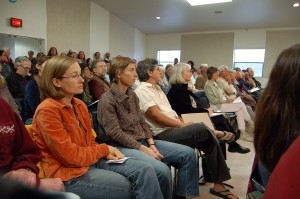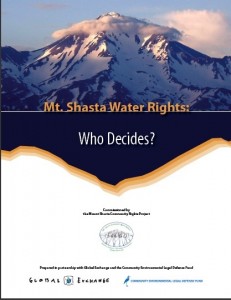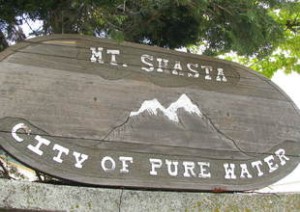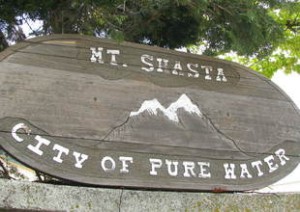At an emergency meeting of the Mt. Shasta City Council this August, Councilman Ned Boss addressed the standing room only crowd, stating that Measure A “is one of the strongest issues the City has ever had…”
The “issue” addressed by citizen-driven Measure A is whether or not residents have the right to protect local water from corporate water bottlers and to stop weather manipulation (chemical cloud seeding) from energy corporation, PG&E. The “issue” is whether important decisions that directly affect the health, safety and welfare of the community belong to citizens—or corporations.
And now the issue is: why is Measure A—an ordinance fundamentally about democratic local self-governance—being stripped from the ballot?
In partnership with Global Exchange and CELDF, residents spent the last eighteen months and hundreds of hours of organizing, signature-gathering and public education campaigning in order to put an ordinance on the ballot this November that bans corporate cloud seeding and bulk water extraction and places community (and nature’s) rights above corporate interests.

Proponent Jen Matthews (left) at a packed city council meeting
Yet in a surprise move August 12, County Clerk Coleen Setzer, threw Measure A off the ballot, claiming it had been filed in the wrong office and also citing a one sentence difference between the initiative filed with the City and the version petitioners signed. However, the previous week at the emergency meeting, the City Council had already voted unanimously to leave Measure A on the ballot, because the error, the result of a clerical mistake, did not change the meaning or intent of the initiative in any way.
“After nearly two years of work by dozens of volunteers, and garnering the petition signatures of over 700 voters, and more than 200 public statements of support at City Council meetings all Spring and Summer—Measure A was killed by the stroke of Setzer’s pen.”, states Ami Marcus.
Within days, proponents had rallied. On August 20, the Mt. Shasta Community Rights Project filed an elections complaint to restore Measure A to the 2010 general election ballot. The elections complaint contends that County Clerk Setzer acted improperly and illegally in taking Measure A off the ballot.
“We followed correct procedures as instructed by the City and County Clerks,” said Molly Brown, the official proponent for Measure A. “The City of Mount Shasta accepted our initial filing, petitions were verified and the City Council voted unanimously to place it on the November 2 ballot.” They fully expect to have Measure A restored on the ballot.

Mt. Shasta Water Rights: Who Decides?
In addition to unilaterally denying residents their fundamental and constitutional right to vote, Setzer accused proponents of playing dirty. This echoed the voices of others standing in opposition to Measure A, including City Councilman Ned Boss and the City Attorney, who publicly lambasted petitioners for having engaged in deliberate deceit as a result of the word difference.
The smear campaign was particularly stupefying, as the City Attorney had already declared that the mistake had no effect on the ordinance. It was also particularly offensive because the ultimate purpose of Measure A is to protect natural resources through community decision-making.
Local Tea Partiers have also taken a curious and fervent oppositional stance in Mt. Shasta. Elsewhere across the nation, Tea Partiers have supported and even campaigned in favor of nearly identical rights-based laws, aligning with the notion of protecting individual and community rights from corporate power.
Despite being portrayed as liars and worse by a small minority, the citizens who first stood up to put Measure A on the ballot are not giving up, and they refuse to surrender their rights. Their struggle is bigger than the tiny town of Mt. Shasta. They are on the frontlines of challenging corporate power, and changing the way the law works for all of us. We must stand up for their rights, as they stand for ours.
TAKE ACTION! Please join our list-serve to keep up to date with the campaign.
Make a contribution today for the necessary legal action needed to keep Measure A on the ballot.
 Blog Action Day is October 15th, 2010. It’s an annual event uniting bloggers around the world who agree to post about the same issue on the same day. The goal is to raise awareness and start a global discussion around an important issue that impacts us all. This year, the theme is water.
Blog Action Day is October 15th, 2010. It’s an annual event uniting bloggers around the world who agree to post about the same issue on the same day. The goal is to raise awareness and start a global discussion around an important issue that impacts us all. This year, the theme is water.



